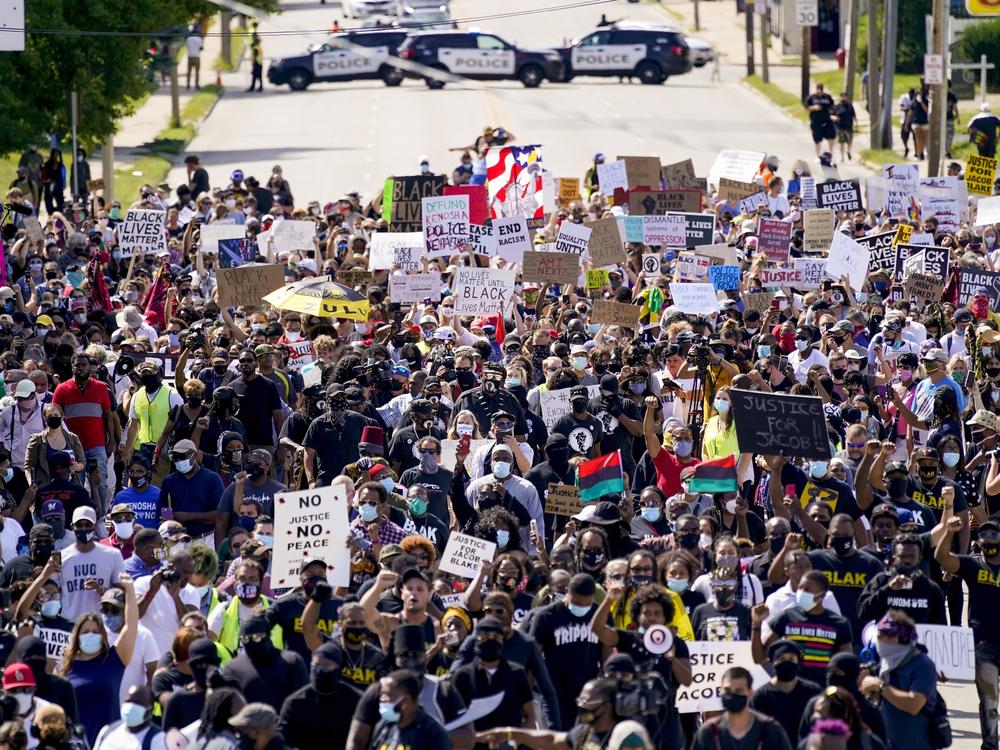Section Branding
Header Content
Kenosha, Wis., Officials Lift Curfew, Citing 'Relatively Peaceful' Recent Protests
Primary Content
Kenosha County, Wis., lifted its nightly emergency curfew on Wednesday, more than a week after it was first enacted in response to protests over the Aug. 23 police shooting of Jacob Blake.
Kenosha Mayor John Antaramian said in a statement that he had made the decision after consulting with law enforcement and community leaders.
"The last several nights have been relatively peaceful in the community, and in the judgment of law enforcement, it is appropriate to remove the curfew," he said. "However, criminal activity will not be tolerated and arrests will be made if needed."
The police department had previously announced the curfew would continue from 9 p.m. to 7 a.m., ending early Labor Day.
The move also follows the filing of a lawsuit by protesters who allege that city officials enforced the curfew selectively by targeting those protesting police brutality in violation of their First Amendment rights.
Protesters took to the streets after a Kenosha police officer shot Blake seven times in the back, leaving him paralyzed and prompting several consecutive nights of unrest. The Wisconsin National Guard was deployed to the city on Aug. 24 to help local law enforcement respond to the protests.
Demonstrations defied the nightly curfew and grew chaotic, with cars and buildings set on fire and law enforcement using tear gas to disperse crowds. NPR member station WUWM in Milwaukee reported that damage to city-owned property is estimated at nearly $2 million.
Violence peaked the night of Aug. 25 when a shooting left two protesters dead and another injured. Illinois teenager Kyle Rittenhouse is facing homicide charges in connection with the shooting. His legal team says he acted in self-defense.
The demonstrations that followed were largely peaceful.
On Tuesday, four people arrested during last week's demonstrations sued the city and county in federal court, claiming the curfew was enforced in a discriminatory manner and violated their First Amendment rights.
The lawsuit stated that the Kenosha County Sheriff's Department arrested more than 150 peaceful protesters but no pro-police demonstrators over the course of nine days, and alleged there are "two sets of laws" being applied, depending on protesters' stance toward the police.
It cited videos that circulated on social media showing law enforcement allowing armed people to remain on the streets as authorities were actively clearing out protesters, and even thanking and giving them water, on the night of Aug. 25.
A lawyer representing Kenosha County and the sheriff's department told the Milwaukee Journal Sentinel that the county would seek the dismissal of the lawsuit, which he called "entirely without merit."
Antaramian, Kenosha's mayor, did not mention the lawsuit in his statement lifting the curfew Wednesday. He said he is hopeful there will be no need to reinstate the curfew in the near future.
President Trump visited Kenosha on Tuesday, and Democratic presidential nominee Joe Biden has announced plans to go there on Thursday.
Copyright 2020 NPR. To see more, visit https://www.npr.org.

